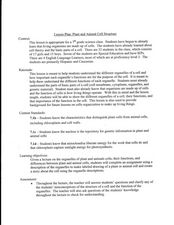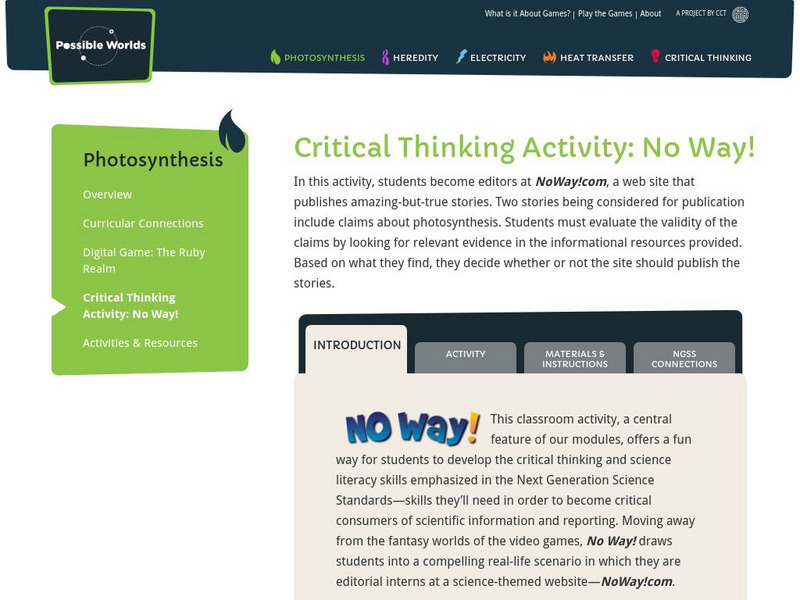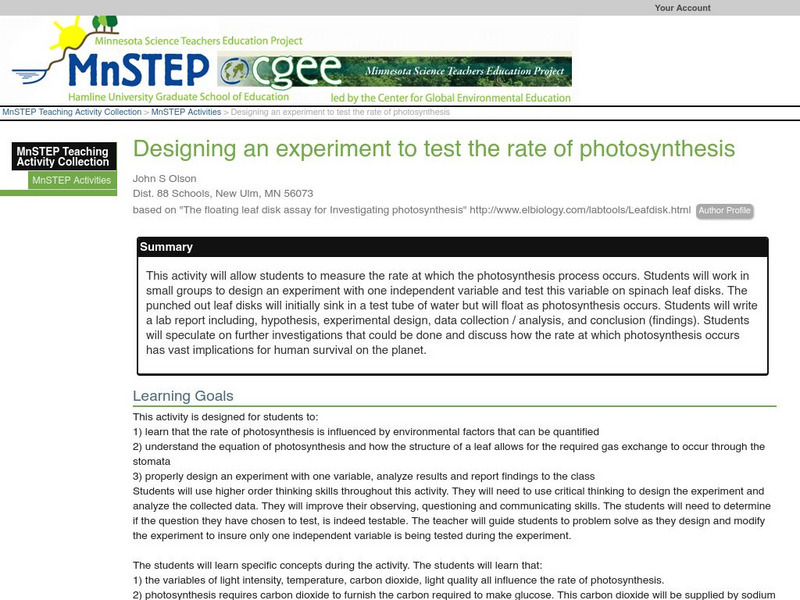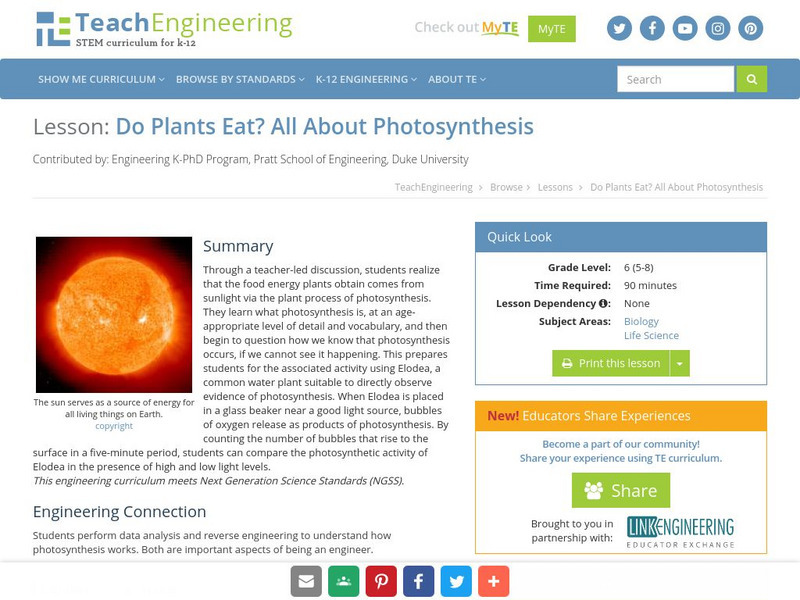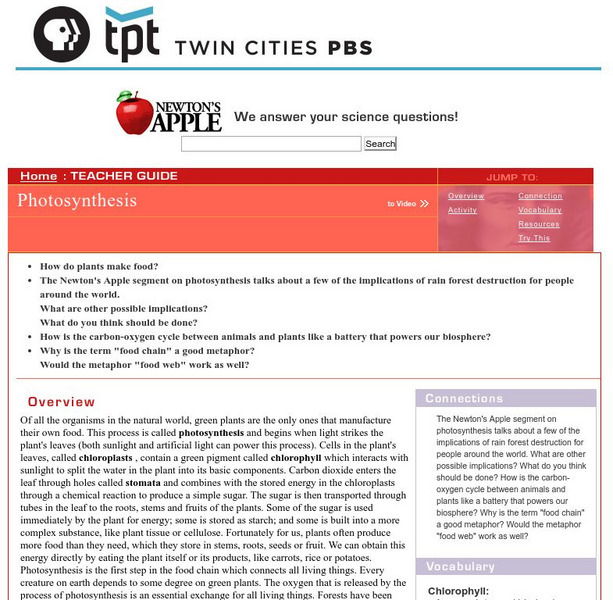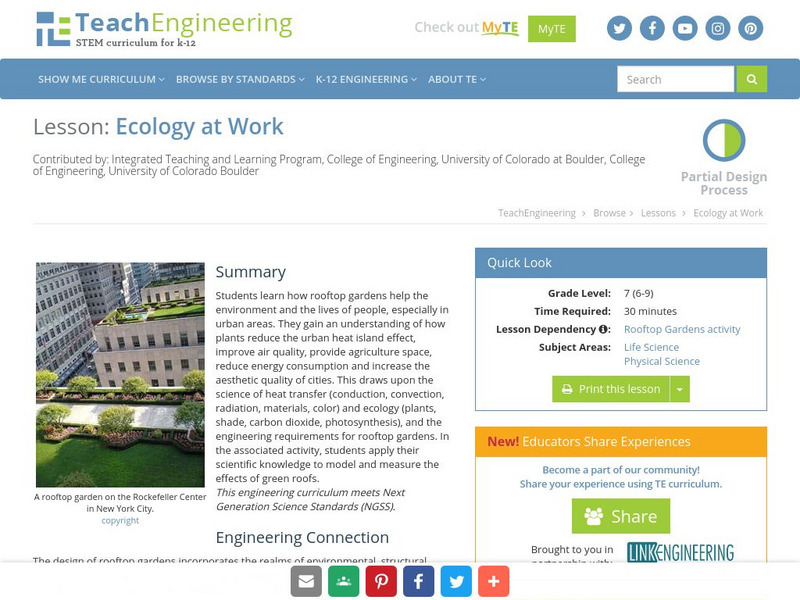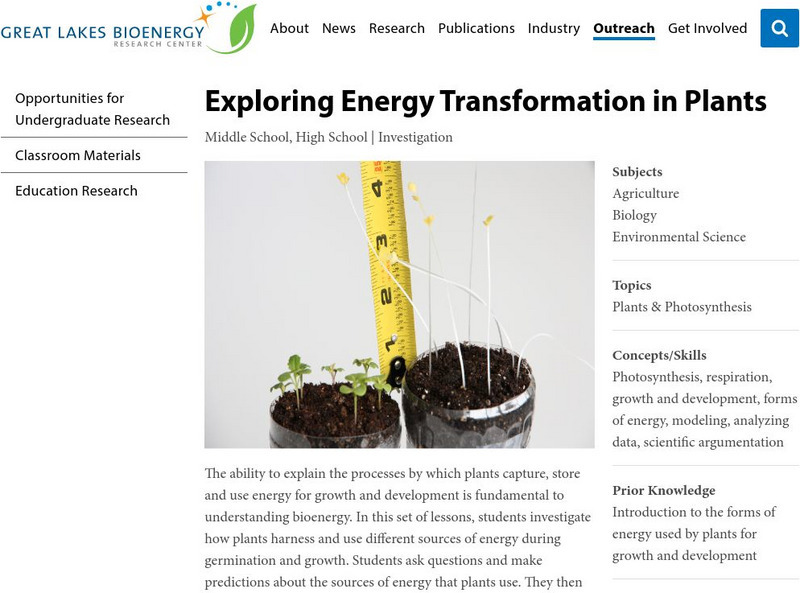Curated OER
Rain Forests: Sustainable Use
Pupils discuss their opinion on a teacher given scenario. In this chemistry lesson, students research the value of rainforests. They relate these ideas to current forestry practices.
Curated OER
The "Coal LIfecycle" Scrapbook
Students discover how coal is formed. In this science lesson, students create a scrapbook on the life cycle of coal and show how coal is formed by showing pictures of each stage.
Curated OER
Merging Art and Science?
Students approach science through artwork. For this art and science lesson students work together to develop theories and gather data.
Curated OER
Plant and Animal Cell Structure
Seventh graders identify the different parts and functions of the cell. In this biology lesson, 7th graders make a labelled diagram of either a plant or animal cell. They write a story about it.
OpenSciEd
Open Sci Ed: 7.4 Matter Cycling & Photosynthesis
This unit on matter cycling and photosynthesis has students investigating the idea that all food comes from plants.
Other
Nearpod: Photosynthesis
In this lesson on exploring photosynthesis, students will explore photosynthesis by examining the reactants and products of this process.
Education Development Center
Center for Children and Technology: No Way: Photosynthesis
Students become editors at NoWay, a web site that publishes amazing-but-true stories. Two stories being considered for publication include claims about photosynthesis. Students must evaluate the validity of the claims by looking for...
Better Lesson
Better Lesson: Photosynthesis and Cell Respiration Foldable
In this instructional activity, students design and create a foldable that consolidates what they have learned about photosynthesis and cellular respiration.
Science Education Resource Center at Carleton College
Serc: Investigating Discovering What Plants Need for Photosynthesis
This activity will be used prior to any direct instruction for photosynthesis. In this inquiry lab, students design and conduct simple experiments using elodea and Bromthymol blue to determine whether plants consume or release carbon...
Science Education Resource Center at Carleton College
Serc: Designing an Experiment to Test the Rate of Photosynthesis
Using spinach leaf disks, students measure the rate at which the photosynthesis process occurs. Students speculate on further investigations that could be done and discuss how the rate at which photosynthesis occurs has vast implications...
Science Education Resource Center at Carleton College
Serc: Energy Flow Through Organisms: Introduction to Photosynthesis/respiration
In this life science classroom activity, students will use cooperative learning and whole class discussions to be introduced to the concept of energy flow through organisms, and understand the basic processes of photosynthesis and...
The Wonder of Science
The Wonder of Science: Ms Ls1 6: Photosynthesis Matter Cycling and Energy Flow
Work samples, phenomena, assessment templates, and videos that directly address standard MS-LS1-6: photosynthesis - matter cycling and energy flow.
TeachEngineering
Teach Engineering: Photosynthesis Life's Primary Energy Source
This lesson plan covers the process of photosynthesis and the related plant cell functions of transpiration and cellular respiration. Students will learn how engineers can use the natural process of photosynthesis as an exemplary model...
TeachEngineering
Teach Engineering: Do Plants Eat?
Through a teacher-led discussion, students realize that the food energy plants obtain comes from sunlight via the plant process of photosynthesis. They learn what photosynthesis is, at an age-appropriate level of detail and vocabulary,...
PBS
Newton's Apple: Photosynthesis: How Do Plants Make Food?
This Newton's Apple activity shows young scholars what sunlight does for plants. David explores what happens to plants when the sun is shining and when it is not. He also looks at how plants survive in the desert.
TeachEngineering
Teach Engineering: Planting Thoughts
Students gain an understanding of the parts of a plant, plant types and how they produce their own food from sunlight through photosynthesis. They also learn about transpiration, the process by which plants release moisture to the...
Science & Plants for Schools
Science & Plants for Schools: Teaching Resources
A collection of teaching resources to help students explore plants! Resources investigate anatomy of plants, reproduction and life cycles, fruits, seeds, classification, photosynthesis, factors that affect plant growth, and respiration....
Climate Literacy
Clean: Carbon Dioxide Sources and Sinks
In this lab activity, students use a chemical indicator (bromothymol blue) to detect the presence of carbon dioxide in animal and plant respiration and in the burning of fossil fuels and its absence in the products of plant...
Alabama Learning Exchange
Alex: Plants, Pigments and Colors
In this hands-on, inquiry based lesson young scholars will see the role of pigments in the in the process of photosynthesis. Students will use the process of chromatography to separate plant pigments. Young scholars will then see the...
TeachEngineering
Teach Engineering: Ecology at Work
Students learn how rooftop gardens help the environment and the lives of people, especially in urban areas. They gain an understanding of how plants reduce the urban heat island effect, improve air quality, provide agriculture space,...
TeachEngineering
Teach Engineering: Biorecycling: Using Nature to Make Resources From Waste
By studying key processes in the carbon cycle, such as photosynthesis, composting, and anaerobic digestion, young scholars learn how nature and engineers biorecycle carbon.
Environmental Education for Kids
Eek!: Activity: Trees and Air Quality
Site offers lessons and activities designed to supplement study of the environment and ecology. Concise explanations are presented on the importance of trees in our world. Also, problem solving and creative thinking is encouraged...
Other
Great Lakes Bioenergy Research Ctr.: Exploring Energy Transformations in Plants
This set of lessons has students investigate how plants obtain energy from different sources to support their growth and development. Students conduct investigations, make predictions, and construct scientific explanations of the...
Other
The Plant Cell: Teaching Tools in Plant Biology: Why Study Plants?
Plants are essential for all life and development. Teach your young scholars about this incredible lifeforce with this teaching guide, lecture notes, and PowerPoint presentation. [PDF]
Other popular searches
- Photosynthesis Worksheets
- Photosynthesis Crossword
- Photosynthesis & Respiration
- Photosynthesis Lab
- Photosynthesis Role Play
- Biology Lab Photosynthesis
- Photosynthesis in Plants
- Science Photosynthesis
- Photosynthesis / Respiration
- Plant Biology Photosynthesis
- Photosynthesis and Respiration
- Unit Photosynthesis





